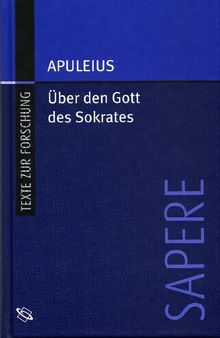دانلود کتاب Apuleius, De deo Socratis - Der Gott des Sokrates
by Apuleius, Matthias Baltes, Marie Luise Lakmann, John Dillon|
|
عنوان فارسی: Apuleius, De deo Socrates - Der Gott des Sokrates |
 دانلود کتاب
دانلود کتاب
 جزییات کتاب
جزییات کتاب
von Matthias Baltes (†), Marie-Luise Lakmann, John M. Dillon, Pierluigi Donini, Ralph Häfner, Lenka Karfíková
---
Some terms from antiquity acquire a whole semantic field that, due to its complexity and plurality of ideas, permeates civilizations and cultures, generating the fascination of contemporary intellectuals who study them in their various historical and social contexts, which they are the springs for expanding the concepts that emerged. The Greek word daemon, -onos, transferred to Latin as daemon, -onis, is one of those terms that expand their meanings at every moment, amidst the literature of authors of immeasurable talent, such as Apuleius, creator of the philosophical work De deo Socratis.
......
The second century of our era was a unique moment in human history, at least as far as the Roman Empire is concerned, which, by assimilating and protecting the heritage of Greek culture, had become what Paul Veyne designates as the Greco-Roman Empire. Even protected by the Roman power, the Greeks of that period tried to restore the grandeur of their πόλεις. This is then the period known as the Second Sophistic, in which Greek orators traveled throughout the Empire disseminating philosophical knowledge through the presentation of lectures. The strands of Epicureanism, Stoicism and Middle Platonism coexist, tempered with a little Aristotelianism. Of the three strands, the last has always been very little studied, at least in terms of Latin Literature. Apuleius of Madaura, in his own words, a Platonic philosopher, like the sages of the Second Sophistic, had become a very successful concert speaker in Carthage and bequeathed us three works on Platonic philosophy. Our work will deal with one of them, De deo Socratis, a lecture given in Latin on one of the most exciting subjects of Middle Platonism, the daemonēs...(from the prologue of De deo Socratis:a demonologia no Império Greco-Romano, by Luiz Karol)
 درباره نویسنده
درباره نویسنده
 آپولیوس(زادهٔ: ۱۲۴ یا ۱۲۵ میلادی در ماداورا شهر باستانی واقع در الجزایر امروزی، درگذشت: ۱۸۰ میلادی)، نویسنده و فیلسوف اهل رم و ساکن آفریقا بود که در سدهٔ دوم میلادی میزیست.
آپولیوس(زادهٔ: ۱۲۴ یا ۱۲۵ میلادی در ماداورا شهر باستانی واقع در الجزایر امروزی، درگذشت: ۱۸۰ میلادی)، نویسنده و فیلسوف اهل رم و ساکن آفریقا بود که در سدهٔ دوم میلادی میزیست. 








 این کتاب رو مطالعه کردید؟ نظر شما چیست؟
این کتاب رو مطالعه کردید؟ نظر شما چیست؟
